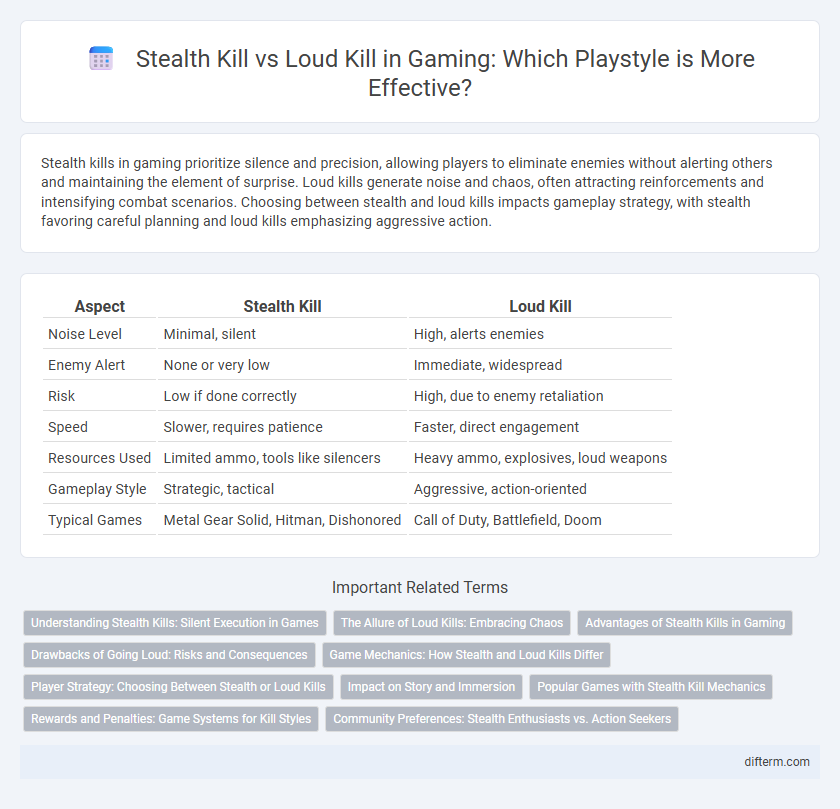Stealth kills in gaming prioritize silence and precision, allowing players to eliminate enemies without alerting others and maintaining the element of surprise. Loud kills generate noise and chaos, often attracting reinforcements and intensifying combat scenarios. Choosing between stealth and loud kills impacts gameplay strategy, with stealth favoring careful planning and loud kills emphasizing aggressive action.
Table of Comparison
| Aspect | Stealth Kill | Loud Kill |
|---|---|---|
| Noise Level | Minimal, silent | High, alerts enemies |
| Enemy Alert | None or very low | Immediate, widespread |
| Risk | Low if done correctly | High, due to enemy retaliation |
| Speed | Slower, requires patience | Faster, direct engagement |
| Resources Used | Limited ammo, tools like silencers | Heavy ammo, explosives, loud weapons |
| Gameplay Style | Strategic, tactical | Aggressive, action-oriented |
| Typical Games | Metal Gear Solid, Hitman, Dishonored | Call of Duty, Battlefield, Doom |
Understanding Stealth Kills: Silent Execution in Games
Stealth kills in gaming emphasize silent execution techniques that allow players to eliminate enemies without alerting others, preserving strategic advantage and immersion. These mechanics often involve precise timing, environmental awareness, and specialized tools like silencers or melee weapons to maintain stealth. Mastery of stealth kills enhances gameplay by promoting tactical decision-making and rewarding patience over direct confrontation.
The Allure of Loud Kills: Embracing Chaos
Loud kills in gaming attract players with their intense adrenaline rush and dynamic combat scenarios where chaos reigns. Embracing loud kills often leads to unpredictable encounters, forcing gamers to adapt strategies and react swiftly to overwhelming enemy responses. This fearless approach heightens immersion, making explosive firefights and high-stakes moments unforgettable experiences.
Advantages of Stealth Kills in Gaming
Stealth kills in gaming offer the advantage of preserving ammunition and resources by eliminating enemies quietly without alerting others, allowing players to maintain the element of surprise. They enable strategic gameplay by avoiding open confrontations and reducing the risk of attracting reinforcements, which is crucial in mission-based or survival games. This approach enhances immersion and rewards careful planning and skillful execution, often resulting in higher in-game rewards or experience points.
Drawbacks of Going Loud: Risks and Consequences
Going loud in gaming exposes players to heightened enemy awareness, increasing the risk of overwhelming opposition and limited strategic options. Loud kills often trigger reinforcements, escalating combat intensity and prolonging engagements that drain resources and health. Noise-generated clues compromise stealth tactics, reducing opportunities for surprise attacks and stealth-based objectives.
Game Mechanics: How Stealth and Loud Kills Differ
Stealth kills in gaming rely on silent, precise actions that avoid alerting enemies, often requiring players to utilize cover, timing, and careful positioning to remain undetected. Loud kills involve aggressive combat with weapons or explosives that draw enemy attention, triggering dynamic AI responses and increased difficulty as foes become alerted and call for reinforcements. Game mechanics differentiate these approaches by balancing risk and rewards, where stealth emphasizes patience and strategy, while loud kills focus on firepower and fast-paced confrontations.
Player Strategy: Choosing Between Stealth or Loud Kills
Players balance risk and reward when choosing between stealth kills and loud kills, relying on environment awareness and enemy behavior to optimize success. Stealth kills prioritize silence to avoid alerting other enemies, enhancing survival and strategic positioning in complex scenarios. Loud kills offer immediate elimination of threats but increase the chance of enemy reinforcements, requiring quick adaptation and resource management.
Impact on Story and Immersion
Stealth kills in gaming often enhance immersion by allowing players to feel like strategic operatives, maintaining tension and engagement through subtlety and precision. Loud kills typically escalate action and chaos, driving the narrative toward high-stakes conflict and amplifying emotional intensity. The choice between stealth and loud kills significantly shapes player experience, influencing storytelling dynamics and the perceived realism of the game world.
Popular Games with Stealth Kill Mechanics
Stealth kill mechanics are pivotal in popular games such as "Metal Gear Solid V: The Phantom Pain," "Dishonored," and "Hitman," allowing players to eliminate enemies quietly and avoid detection, enhancing immersion and strategic gameplay. These games feature diverse stealth approaches, including silent takedowns, environmental manipulation, and disguise, to progress without triggering alarms or loud confrontations. Compared to loud kills, stealth kills emphasize patience, precision, and tactical planning, often rewarding players with better mission ratings and alternative story outcomes.
Rewards and Penalties: Game Systems for Kill Styles
Stealth kills in gaming often reward players with higher experience points, exclusive loot, and increased reputation, emphasizing precision and strategy. Loud kills typically grant faster progression through combat encounters but come with penalties such as increased enemy alerts, reinforced opposition, and reduced stealth bonuses. Game systems balance these kill styles by integrating adaptive AI responses and varied mission rewards to encourage diverse gameplay approaches.
Community Preferences: Stealth Enthusiasts vs. Action Seekers
Stealth kill methods attract a community valuing strategy, precision, and immersive gameplay, often favoring tactical planning and patience in titles like Metal Gear Solid or Hitman. Loud kill approaches appeal to action seekers who prioritize fast-paced, high-adrenaline combat experiences found in games such as Call of Duty and Doom. Community forums and player polls highlight a clear divide, with stealth enthusiasts promoting skillful evasion and silence, while action seekers celebrate aggressive, chaotic gameplay dynamics.
Stealth Kill vs Loud Kill Infographic

 difterm.com
difterm.com